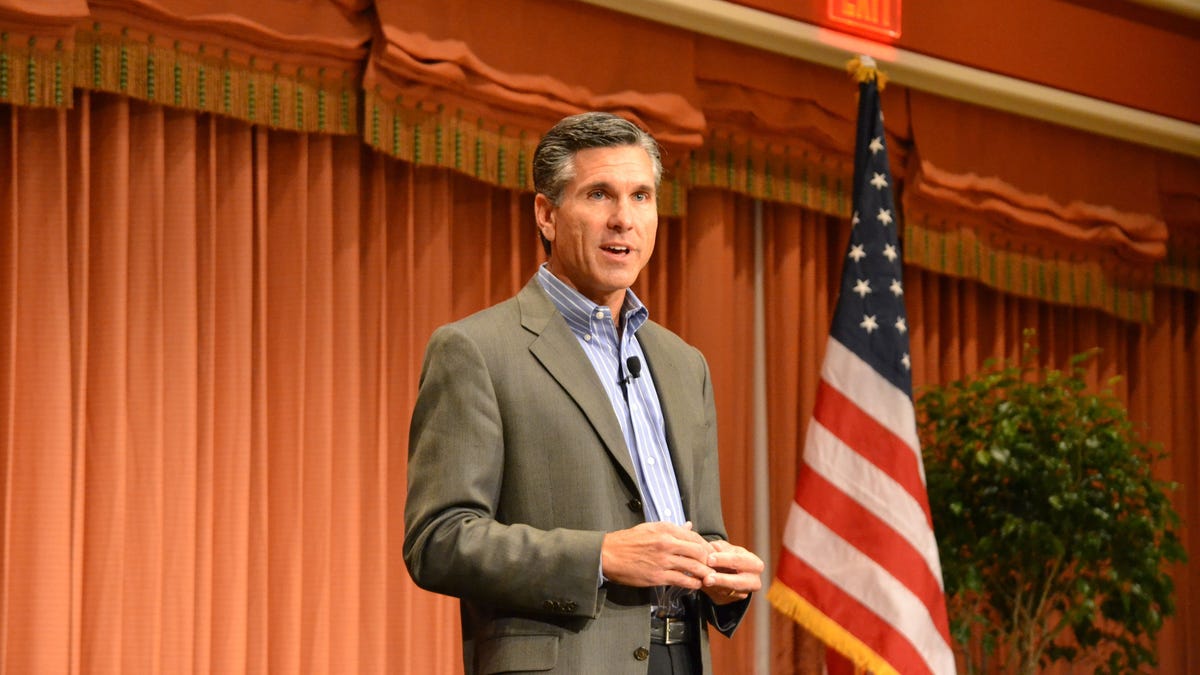T-Mobile exec says firm 'lost something' awaiting merger
COO says the carrier lost its focus on customers while awaiting the eventually scotched merger with AT&T. And he says the company is working to regain its credibility in the market.

LAS VEGAS -- T-Mobile lost its focus on customers while its $39 billion deal to be acquired by AT&T was being reviewed by regulators, said T-Mobile Chief Operating Officer Jim Alling.
On Tuesday, Alling addressed executives at the Competitive Carrier Association conference here. He explained how T-Mobile's long history of providing great customer service to its subscribers was interrupted by the merger and employees lost their focus.
"We lost something after the AT&T merger was announced," he said. "We fell out of balance. And now we have to regain the trust of our employees and customers and regain credibility."
T-Mobile saw its customer losses almost triple in 2011 while the deal with AT&T was being considered. Though T-Mobile's former CEO, Philipp Humm, had blamed the customer defections on the fact that the company didn't offer the iPhone and its three biggest customers did, Alling indicated that T-Mobile's lack of focus on customer service may have also contributed to the defections. And he said the company is focused on turning that around.
"Every single customer matters," he said. "That is the most important thing we have to rekindle."
Alling, who stepped in as interim CEO when Humm stepped down earlier this year, said the company is now on the right track. But more work is needed. He said the company needs to refocus on training its staff to better help customers resolve issues. And he emphasized that employees need to take responsibility for rebuilding T-Mobile's brand.
He told the audience a story to make his point. On a recent trip to New York City, he said, he walked by a T-Mobile store at night and saw that the first few letters of the neon sign were burned out. As a result, the glowing pink sign read "bile" instead of "T-Mobile."
He said he immediately got on the phone with his staff to have the issue corrected. And the sign was fixed.
"Obviously, this isn't the message we wanted to convey to customers," he quipped. But he said that this seemingly minor issue in one store was emblematic of what needs to be done across the country in terms of individual employees taking responsibility for ensuring that T-Mobile's brand is strong.
"We need to make sure we are sending the right message to consumers," he said.
Alling said he's encouraged by the addition of T-Mobile's new CEO, John Legere.
"It's great to have a new CEO in place," he said. "He's customer focused and he wants to compete against the big guys. He wants to put us in a position where we win."
Still, T-Mobile faces plenty of challenges as it tries to compete aggressively against the other national carriers. It must slow customer losses. And it needs to complete a major network upgrade, which entails moving some customers off its existing wireless spectrum to roll out its new 4G LTE service. The task, which has been likened to remodeling a home while the occupants are still living in it, needs to go smoothly so existing customers don't experience service interruptions.
The company is also facing a competitive market in which the two biggest players, Verizon Wireless and AT&T, control much of the airwaves to deliver service, and already serve the majority of customers in the U.S.
This is one reason why T-Mobile joined smaller rural and regional carriers in the newly branded Competitive Carrier Association. The company believes that with the other 100 plus carrier members of the CCA it can effectively lobby lawmakers and FCC officials for more favorable competitive policies. He said that many issues that are important to T-Mobile, such as access to wireless spectrum, are also important to smaller carriers that have originally made up the CCA. (Until earlier this month, the CCA was known as the Rural Cellular Association.)
"We plan to work with the CCA to influence critical issues that make a difference to all of us," he said. "We have a responsibility to do that and to make sure we have a fair marketplace."

